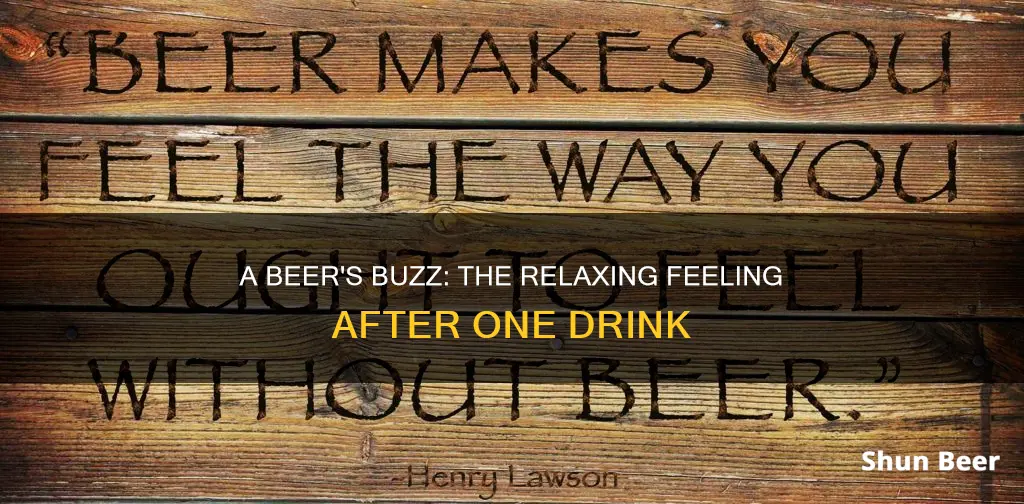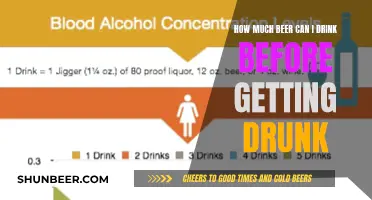
How people feel after drinking one beer varies from person to person. Some people report feeling drunk after one beer, while others may not feel any effects at all. Various factors can influence how one beer can make a person feel, such as weight, tiredness, recent food consumption, and alcohol tolerance. Additionally, the type of beer and its alcohol content can also play a role in how a person feels after drinking it.
What You'll Learn

Feeling drunk after one beer
Other factors that may contribute to feeling drunk after a single beer include genetics, with certain genes making some people more sensitive to the effects of alcohol. Dehydration can also enhance the impact of alcohol, causing you to feel drunk more quickly. Furthermore, factors such as lack of sleep, switching time zones, and age can also influence alcohol tolerance and the overall drunk feeling.
It is important to note that everyone's experience with alcohol is unique, and factors such as gender, metabolism, and overall health can also play a role in how one feels after drinking.
Beer and Prednisone: Is It Safe to Drink?
You may want to see also

Weight and alcohol tolerance
In general, the less a person weighs, the more they will be affected by a given amount of alcohol. This is because alcohol has less room to spread out, making the concentration higher. For example, a person weighing 100 lbs may feel very buzzed after one beer, whereas someone heavier may not feel the effects as strongly.
Body composition also plays a role. Fatty tissue does not contain much water and will not absorb alcohol, so individuals with a higher percentage of body fat will have a higher peak BAC than those who are leaner, even if they weigh the same.
Gender is another factor that influences alcohol tolerance. Women tend to have a higher percentage of body fat and a lower percentage of body water than men. They also have lower levels of dehydrogenase, the enzyme that breaks down alcohol in the stomach, which contributes to higher BACs.
Other factors that can influence how alcohol affects an individual include:
- Biological sex
- Hormone levels
- Mood
- How quickly the drinks are consumed
- Whether food has been consumed
- The type and strength of the drink
- Any medications or supplements being taken
- Fatigue
- Expectations of the alcohol's effects
Drinking Beer on the Porch: Legal or Not?
You may want to see also

Alcohol flush reaction
The alcohol flush reaction is caused by a deficiency in the aldehyde dehydrogenase 2 (ALDH2) enzyme, which is responsible for breaking down acetaldehyde. This deficiency is due to a genetic variant, known as the ALDH2*2 allele, which is most common in people of East Asian descent. Approximately 30-50% of Chinese, Japanese, and Korean individuals exhibit the alcohol flush reaction, which includes symptoms such as facial flushing, nausea, headaches, and an increased heart rate.
The accumulation of acetaldehyde in the body triggers a histamine response, leading to dilation of the facial blood vessels and skin discolouration. While the flush itself is not dangerous, it indicates high alcohol sensitivity and an increased risk of health problems such as high blood pressure and certain types of cancer, especially of the upper digestive tract.
The only way to prevent alcohol flush reaction is to avoid or limit alcohol intake. While antihistamines can reduce the symptoms, they do not address the underlying cause. It is important to recognise that even individuals who do not experience this reaction are still at risk of the health complications associated with alcohol consumption.
Is Expired IPA Beer Drinkable?
You may want to see also

Feeling buzzed vs. drunk
Feeling buzzed and feeling drunk are two different stages of alcohol intoxication that can have varying effects on individuals. The experience of being drunk can feel different for everyone, but it commonly results in a decrease in inhibitions and a heightening of emotions.
Feeling Buzzed
When an individual is feeling buzzed, they are likely to experience increased confidence and a willingness to take risks. They may also have slightly slower motor skills, a shorter attention span, and impaired memory. Being buzzed is generally associated with positive feelings, and individuals typically have control over their speech and body. However, it is important to note that even at this stage, alcohol decreases motor skills and starts to affect the brain, so it is recommended to have a designated driver if planning to drive.
Feeling Drunk
The drunk stage of intoxication can be identified by terms such as "trashed" or "hammered." This stage is associated with more severe signs and effects, including lack of coordination, slowed breathing, and a slower heart rate. Being drunk can bring about more unpleasant moods and effects, and there is an increased risk of serious issues such as dehydration, vomiting, injuries, seizures, and even death.
Factors Affecting Alcohol Intoxication
It is important to note that the effects of alcohol can vary depending on several factors, including age, weight, drinking history, amount of food consumed, and other drugs taken. Older individuals, those with little drinking experience, females, and smaller people may have a lower tolerance for alcohol. Additionally, factors such as tiredness and not eating enough can also intensify the effects of alcohol.
Blood Alcohol Content (BAC)
The amount of alcohol in an individual's bloodstream is measured by Blood Alcohol Content (BAC). A BAC of 0.08 is the legal limit of intoxication in the United States, and driving with a BAC above this limit is illegal. As BAC increases, the effects of alcohol become more pronounced, leading to emotional instability, loss of coordination, confusion, blackouts, and eventually, critical issues such as loss of breathing and gag reflex, which require immediate medical attention.
Beer and Salvation: Can Christians Drink Responsibly?
You may want to see also

Drinking on an empty stomach
The absence of food in the stomach can also lead to faster intoxication and an increased risk of alcohol poisoning. This is because the body absorbs alcohol faster than it can break it down, resulting in sudden spikes in blood alcohol concentration. Alcohol poisoning can be life-threatening and requires immediate medical attention. Some common signs of alcohol poisoning include the lack of a gag reflex, loss of consciousness, slow or irregular breathing, low body temperature, and dulled or delayed responses.
While drinking on an empty stomach may make you feel drunk faster, it is important to note that it does not necessarily increase the risk of specific long-term health issues. However, it is still crucial to drink responsibly and in moderation. It is recommended to drink in proportion to your personal tolerance, avoid drinking too much or too quickly, and be mindful of any medications you are taking that may interact with alcohol.
Secondary Fermenter Beer: Safe to Drink?
You may want to see also
Frequently asked questions
Drinking one beer on an empty stomach will affect you more than drinking it on a full stomach. Other factors that can influence how you feel after one beer include weight, height, level of tiredness, and whether you've drunk alcohol recently.
This varies from person to person. Some people feel something after half a beer, while others need a full beer or more.
This varies depending on the person, the type of beer, how much food they've eaten, and other factors. Some people report feeling drunk after one or two beers, while others may need three or more.
This could be due to the carbonation in beer, which can make people feel fuller.
This could be due to a variety of factors, including weight, height, metabolism, and alcohol tolerance.







